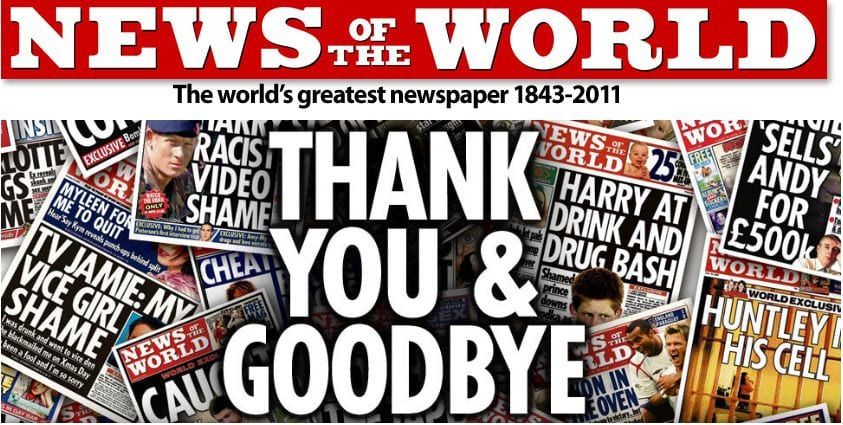 Do you remember the outrage generated when it became clear that the footage of Mohammed al-Dura’s alleged death by IDF bullets was revealed to be carefully edited?
Do you remember the outrage generated when it became clear that the footage of Mohammed al-Dura’s alleged death by IDF bullets was revealed to be carefully edited?
Or when the media got it wrong over the “Jenin Massacre”? What about those Photoshopped images from Reuters during the 2006 Lebanon conflict?
Sure you remember the outrage that you felt along with Israel’s supporters but that outrage never penetrated the consciousness of the wider publics whose national media outlets were responsible for reporting that ranged from shoddy to outright libel.
As a former Brit, I admit to reading the News of the World on the odd Sunday many years ago, albeit the sports pages (I relied upon the more cerebral Sunday Times for ‘real’ news).
While it would be a stretch to link the so-called “Hacking Scandal” to reportage in the Middle East and specifically Israel, it is worth pointing out what events involving Rupert Murdoch’s News Corp titles in the UK do signify for journalism in general.
Without going into the dark recesses of the story and the political and criminal implications that are dominating the news in the UK, suffice to say that the biggest selling tabloid, the News of the World, was caught having hacked into the cellphone voicemail messages of various public figures, celebrities and possibly even members of the Royal Family.
But even worse, it has now been revealed that some 4000 people were victims. This included hacking into the cell phone of a murdered teenager, which disrupted the police investigation at the time, and family members of some of those murdered in the London terrorist attacks of July 7, 2005.
These last revelations pushed public and political opinion over the edge and caused advertisers to desert the News of the World, which printed its final edition last Sunday after 168 years of publication. It remains to be seen if other titles in the News Corp stable such as The Times of London and The Sun have also engaged in unethical and criminal activities.
What can we learn from this with relation to our own difficulties with media reporting of Israel?
- Journalists and editors are certainly not infallible. Not only do they make mistakes but, as we have seen, they can also use highly unethical and potentially criminal means to get their exclusives.
- Related to this, we cannot unthinkingly rely upon journalists and media to be the ‘moral arbiters’ of the Arab-Israeli conflict. In light of what has happened in the UK, whose media increasingly preaches to Israel about standards of behavior, it would be hypocritical for those same publications to moralize about Israel.
Sadly, one of those UK papers that takes such a holier-than-thou attitude towards Israel, The Guardian, has also been responsible for revealing the unethical actions of its media rivals.
Of course, the actions of the News of the World and possibly other News Corp titles are inexcusable. But this does not hide something of a double-edged sword for those of us who monitor the media’s Israel coverage.
While they have not been immune from coming under HR’s spotlight, News Corp’s titles such as The Times, have been the most favorable towards Israel in a particularly hostile market.
Also worthy of note are calls in the UK for the strengthening of independent bodies such as the Press Complaints Commission that are supposed to hold the media to account and should have the ability to impose real sanctions on offending publications. The history of complaints to the PCC regarding Israel coverage in the UK is a sorry one where most complaints have been unsuccessful.
And the BBC, a serial offender when it comes to its Israel coverage, has its own internal complaints system answerable only to the supposedly independent BBC Trust.
Perhaps the current scandal gripping the UK media will lead to greater regulation and accountability. Will this have any impact on journalistic standards governing reporting from Israel? I’m not going to hold my breath.



